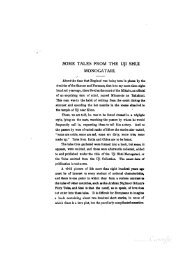Chau Ju-Kua - University of Oregon Libraries
Chau Ju-Kua - University of Oregon Libraries
Chau Ju-Kua - University of Oregon Libraries
You also want an ePaper? Increase the reach of your titles
YUMPU automatically turns print PDFs into web optimized ePapers that Google loves.
1,23 MECCA. ] 25<br />
jewels and precious stoues. Then also is the House adorned anew with silk<br />
brocade.<br />
Farther oif there is the tomb <strong>of</strong> the Buddha. Continually by day and<br />
night there is at this place such a brilliant refulgence (p; ^) that no one<br />
5 can approach it; he who does loses his sight.<br />
Whosoever in the hour <strong>of</strong> his death rubs his breast with dirt taken<br />
from this tomb, will, they say, be restored to life again by the power <strong>of</strong> the<br />
Buddha.<br />
Note.<br />
10 The journey from Mirbat on the H^dramaut coast, through the Tehama (south-west coast<br />
<strong>of</strong> Arabia) to Mecca was the old trade-route <strong>of</strong> the Sabeans, it is presumably the one referred to<br />
in our text.<br />
The whole <strong>of</strong> this chapter is taken from Ch6u K'tt-fei (3,2*'). He says: aThere is the country<br />
<strong>of</strong> Ma-kia, which is reached if one journeys for eighty days and more westward by land from the<br />
15 country <strong>of</strong> Ma-li-pa. It is the place, where the Buddha Ma-hia-wu (Mohammed) was born. In the<br />
House (^ ~)j ^) <strong>of</strong> the Buddha, the facings <strong>of</strong> the walls <strong>of</strong> the rooms are <strong>of</strong> precious stones<br />
(^)-<strong>of</strong> every colour. Every year, when the anniversary <strong>of</strong> the Buddha's death comes roiind, all<br />
the princes <strong>of</strong> the Ta-shi send people bearing presents <strong>of</strong> jewels, gold and silver, and they cover<br />
the House (yjf ^^ i. e., the Kaaba) with silk brocades. Yearly the (various) countries (<strong>of</strong> the<br />
20 Ta-shi) come here to visit the House and to <strong>of</strong>fer prayers. Furthermore the high <strong>of</strong>ficials <strong>of</strong> these<br />
countries are not deterred by a journey <strong>of</strong> a myriad U; they all assemble to worship the House.<br />
ccFarther <strong>of</strong>f (literally, Bbehind» .:i^) there is the tomb <strong>of</strong> the Buddha, where day and<br />
night there is such a brilliant refulgence that no one can approach it, those who do shut their<br />
eyes ('^ BM' ^^^ ^^^ ^y- '* ^* ^^'"^ ^^^^ '^ ^ ^^'^ ^^ dying and takes some dirt from oif this<br />
25 tomb and smears it on his breast, he is restored to life, so great is the power <strong>of</strong> this Buddha!»<br />
Chou K'ii-fei is, so far as lam aware, the first Chinese author who wrote <strong>of</strong> Mecca. The<br />
T'ang-shu (22l'',23) speaks <strong>of</strong> Mohammed (|$ =|n[ ^) and <strong>of</strong> Medina (^ Jjjj ^|5), <strong>of</strong> the<br />
Black Stone <strong>of</strong> the Kaaba, but not <strong>of</strong> Mecca. It gives, however, some interesting information about<br />
Islam which our author might with advantage have incorporated in his work^ Among other<br />
30 things, it speaks <strong>of</strong> the five daily prayers to the nSpirit <strong>of</strong> Heavenu (^^ )Iiw)i ^°^ <strong>of</strong> the<br />
mosques, which it calls li-t'ang (mp ^), and which can hold many hundreds <strong>of</strong> people. aHere<br />
every seven days the king from a high seat speaks to those below saying: 'Those who die fighting<br />
shall be born in Heaven; those who kill an enemy shall receive happiness)).<br />
The oHouse <strong>of</strong> the Buddha)) <strong>of</strong> Chou's text is not the Prophet's birthplace (Maulid el Naby)<br />
85 in Mecca, but the oHouse <strong>of</strong> Allah» (Bayt Ullah), better known as the Kaaba or ocube housei);<br />
the Chinese name<br />
{~fj ^) has the same sense. In the Yuan and Ming periods Mecca was<br />
called «The Heavenly square)) (^ ~^)j ^^ abbreviation <strong>of</strong> the earlier name.<br />
Burton, Pilgrimage to El Medinah and Meccah, II, 278 says that the birthday <strong>of</strong> the<br />
Prophet (twelfth <strong>of</strong> the month Eabi' el Auwal) is celebrated in Mecca with great festivities, feasts,<br />
40 prayers and perusals <strong>of</strong> the Koran.<br />
On the brilliant light which is said to emanate from the tomb <strong>of</strong> the Prophet, con£ what<br />
Barthema, who was in Medina in 1503, says <strong>of</strong>it in his travels (Purchas, His Pilgrimes, IX, 66).<br />
When visiting the tomb <strong>of</strong> the Prophet, the Elders who accompanied him and the Captain <strong>of</strong> his<br />
party suddenly cried out; awe asked what was the cause <strong>of</strong> that exclamation. The Elders<br />
45 answered: Saw you, not the lightning which shone out <strong>of</strong> the Sepulchre <strong>of</strong> the Prophet Mahumet,<br />
Our Captaine answered, that he saw nothing; and we also being demanded, answered in like<br />
manner It is therefore to be understood, that none other shining came out <strong>of</strong> the<br />
Sepulchre, than a (iertaine flame which the Priests caused to come out <strong>of</strong> the place <strong>of</strong> the Tower<br />
spoken <strong>of</strong> here before, whereby they would have deceived us)). . .<br />
,

















